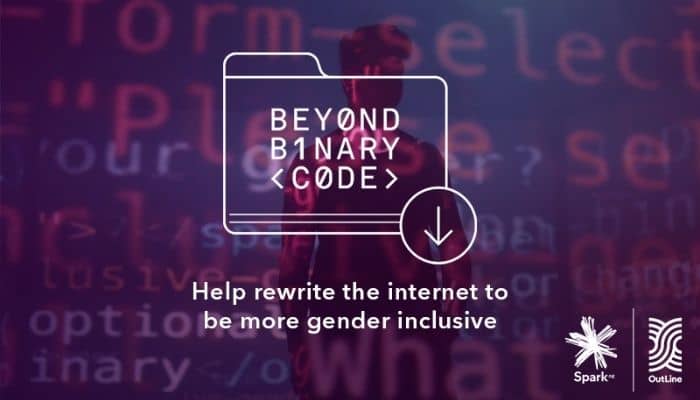Auckland, New Zealand – When we fill out a form on a website, most of the time we get asked about our gender. But sadly, the large majority of sites use the same two classifications: male or female. For many people across all gender spectrums, they feel unrepresented and are forced to choose an identity that they know is not theirs.
In a bid to promote gender inclusiveness across websites, New Zealand telco Spark has worked with rainbow mental health organisation OutLine Aotearoa and creative agency Colenso BBDO to create a campaign where they developed a code that websites can adopt to their platforms to feature more gender-friendly options in their forms online.
This code revises the way organisations collect gender data by updating website forms and fields with gender-inclusive options so everyone can feel seen. In addition, the code comes with helpful materials to support businesses on their beyond binary journey, including guides on data privacy principles, how to get stakeholder buy-in and how to create safer spaces both on and offline for their customers and employees.
Claire Black, general manager at OutLine Aotearoa, said, “Often businesses default to asking for gender without considering why they need that information and how it might impact the people on the other end of the form. When trans and non-binary people are excluded, misgendered, or discriminated against during daily interactions with businesses, that contributes to an environment that is hostile to their wellbeing.”
However, the organisation pointed out that the code, known as ‘Beyond Binary Code’, is not just code, but rather a full tool that helps businesses understand, first and foremost, whether they truly need to collect gender data from their customers at all. If they do, an HTML code is generated based on their unique business needs, so they can ask in an inclusive way.
“OutLine sees this code, and its supporting resources, as a catalyst for creating better experiences that support and affirm the wellbeing of both non-binary people and rainbow communities more broadly in Aotearoa,” Black added.
Meanwhile, Matt Bain, marketing director at Spark New Zealand, notes that this campaign intersects two key ambitions at Spark – helping Kiwis have a better relationship with their data, and to champion diversity and inclusion within Spark and Aotearoa. He also added that in time and with the help of businesses adopting the code, they hope to build an internet with richer, more sophisticated datascapes that represent the true diversity of New Zealand.
“Ultimately, through publishing the code, we want to encourage digital equity at an enterprise level. By influencing big data systems in businesses to evaluate whether they need to collect gender data at all and if it is required, that they do so in a way that helps people from all genders feel valued and visible online,” Brian said.
Simon Vicars, CCO for Colenso BBDO added, “For lots of people, filling in an online form is a simple box-ticking exercise. But for people who identify beyond male or female, it can reinforce the feeling that society doesn’t acknowledge them. Beyond Binary Code has the power to rectify this – to help rewrite the internet to see more than two genders. We’re proud to finally see the idea out in the world, and excited to see the difference it can make.”
Beyond Binary Code launched 21st February with a powerful film and digital campaign to support the website.

